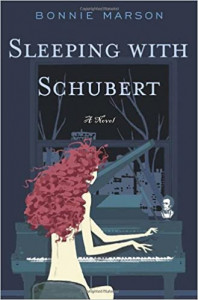 A young professional woman who doesn’t realize just how discontented she is with her routine life is suddenly possessed by the spirit of a well-known classical composer. It’s a good premise for a story.
A young professional woman who doesn’t realize just how discontented she is with her routine life is suddenly possessed by the spirit of a well-known classical composer. It’s a good premise for a story.
Liza Durbin, who lives in Brooklyn and works for a Manhattan law firm, is visiting her parents in California. While shopping with her father at a department store, she is drawn irresistably to the piano, where she sits down, plays like she’s never played before, and then faints. Over the next few days, she comes to believe that, somehow, Franz Schubert has taken up residence inside her.
Liza took a few piano lessons when she was a kid, but nothing that could have prepared her for this. She plays with a passion and skill that seem to spring from elsewhere, and in fact sometimes seems to get totally lost in the playing. She wakes up in the middle of the night, sitting naked at her kitchen table, playing an imaginary keyboard. She starts forgetting to go to work. Her already dismal love life gets worse. And her unruly hair is a total mess.
It is indeed a good premise, but Marson, an artist writing her first novel, fails to deliver.
Over and over again, Marson breaks one of the cardinal rules of writing: “show, don’t tell.” Marson’s attempts to tell us what is going on mostly fall flat. When her family discusses her newfound gift (before they discover its origins), they pull her in several directions — some think she should become a professional, but she’s not sure. “My father was not convinced that I wanted that. Neither was I. A large family discussion was brewing.” — Clunk! — She clumsily attempts to describe people’s motives: “There are people who demonstrate deep concern by giving advice. Whether they have any clue about what to do is not the point. They have to feel they’re helping.” — Clunk! — When she tells her teacher/sponsor that they can play a duet together in her debut concert, the teacher “… allowed herself to relish this decision for a quick moment. Then she was back to business.” — Clunk! — You get the idea. For instance, how did the teacher “relish the decision? Did she roll her eyes, hold her breath, get an atypical dreamy expression, hum a few notes of the piece in question? We don’t know. We’re only told that she “relished” it. Why do I feel like a freshman-level English teacher grading a paper by a student who shows promise, if she’s willing to do a lot of hard work and develop her talent? Why didn’t her editor do this for her?
There’s more: As are most novice writers, Marson is far too enamored of similes. She needlessly repeats details, particularly about Liza’s past relationships. Sections of dialog that advance the subplots are clumsily inserted. We think she had sex with somebody, but we don’t know for sure until a chapter or two later, when she can “tell, not show” it to us in flashback — for no apparent reason except perhaps to keep us guessing what happened for a while. A cheap trick. Because the book is written in first person, we never really get to know the secondary characters because Liza — or rather, Marson — doesn’t know them very well. Repeatedly, again for no apparent reason but to advance the plot, Liza neglects to tell the most important people in her life about the most important details in her own life.
There is some good writing along the way — a description of a stroll through Greenwich Village early on is nice — and the writing does get better toward the end of the book, particularly when she begins to “see” more of Franz’s life through his own eyes. But it was too much of a slog to make it worth getting there, for too little payoff.
The book has a companion CD of the same title, but it does little to illuminate the story — many of the selections named in the book are not on the CD and vice-versa, and many of the recordings are of symphonic works or quartets, rather than piano transcriptions, which is how Liza comes to know them best and performs them.
Marson’s story falls short of its promise. Sleeping With Schubert should perhaps have been left unfinished.
(Random House, 2004)
